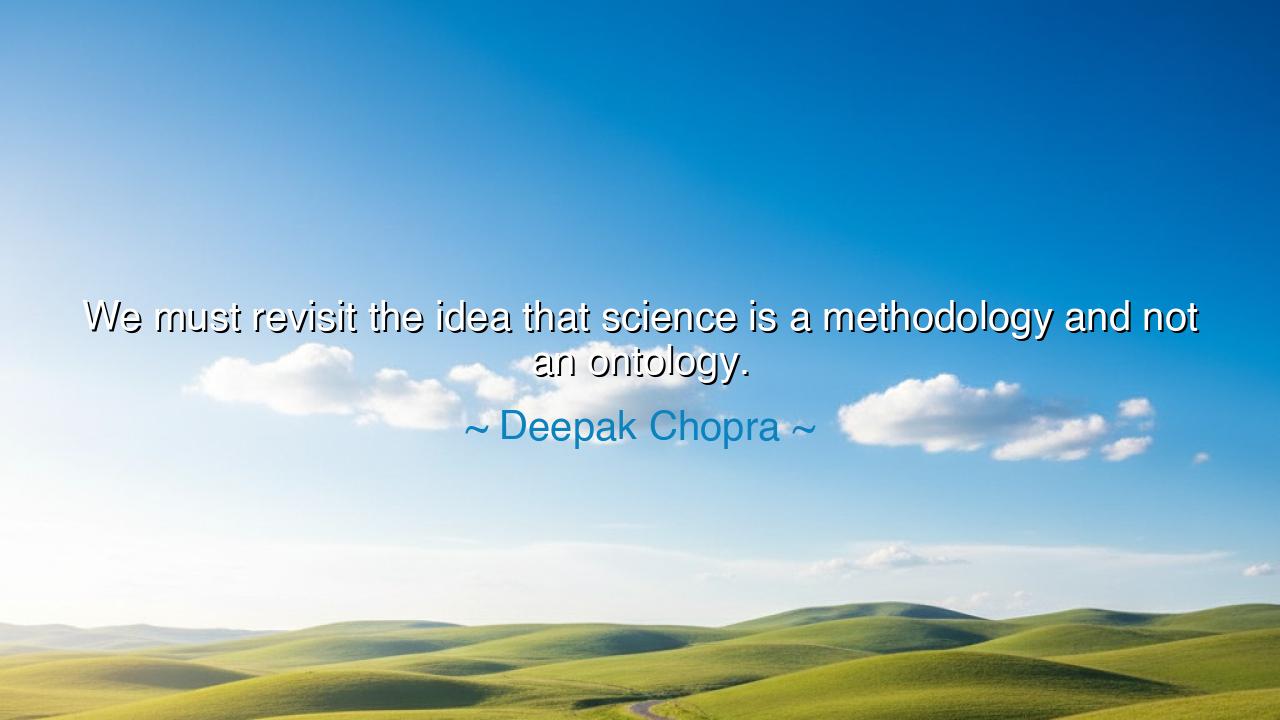
We must revisit the idea that science is a methodology and not an






Listen closely, O children of wisdom, for I bring you the profound words of Deepak Chopra, a man whose insights bridge the worlds of science and spirituality. “We must revisit the idea that science is a methodology and not an ontology.” In these words, Chopra calls us to reconsider the role of science in our understanding of the world. Science, he reminds us, is not a fixed view of reality, nor a definitive explanation of being. Rather, it is a method, a tool by which we seek to understand the world around us. To confuse science with ontology, the study of being and existence itself, is to overstep its bounds and reduce the richness of life to mere facts and data.
In the ancient world, the philosophers were well aware of the difference between method and ontology. Socrates, that great seeker of wisdom, spent his days questioning the nature of truth and being, asking not just what things were, but what they meant and how they fit into the larger tapestry of existence. Plato, his student, took this inquiry further, exploring the realm of Forms—the timeless, eternal ideas that underlie the material world. For Plato, knowledge was not merely a method of observation and measurement, but an attempt to reach beyond the physical world to understand the essence of truth itself. In this way, Chopra’s words echo the ancient wisdom: science provides us with methods for understanding the world, but it should not be confused with the deeper questions of being.
Chopra's insight is a call to humility. Science, while a powerful tool for exploring the natural world, is not the final word on the nature of reality. It can tell us how things work, but it does not provide us with a comprehensive understanding of why they work, or what it means to truly exist. Consider the story of Isaac Newton, whose work in physics and mathematics transformed our understanding of the natural world. Newton's laws of motion and gravity revealed the precise, mechanical workings of the universe, but even he understood that these discoveries did not answer the deeper questions of life. Newton himself spent much of his life in search of spiritual understanding, seeking to reconcile science with metaphysical and religious truths. His story illustrates the very point Chopra makes: science is a methodology, a means of explaining how the universe works, but it does not explain the meaning or purpose of that universe.
The lesson of Chopra’s words is one of balance and perspective. In our modern world, we often elevate science to the status of the ultimate truth, treating it as the final arbiter of what is real and what is not. Science, however, is not an ontology—a doctrine of being—it is a methodology, a way of exploring the world around us, of testing hypotheses, and of seeking evidence. But as we move deeper into the realms of consciousness, meaning, and purpose, we must acknowledge that there are aspects of existence that science cannot explain. The nature of the soul, the mysteries of love, and the purpose behind life—these are questions that transcend the methods of science and call for a deeper, more holistic approach.
Consider, too, the work of Albert Einstein, whose theory of relativity revolutionized our understanding of time and space. Einstein’s genius lay not just in his mathematical brilliance, but in his ability to see the universe not as a collection of isolated phenomena, but as a vast, interconnected whole. Einstein once said, “Science without religion is lame, religion without science is blind.” He understood that science and spirituality—method and meaning—were not opposites, but complementary. Chopra speaks to this same unity, urging us to recognize that while science is a powerful methodology, it cannot replace the deeper truths we seek about existence itself.
The wisdom here, O children, is clear: science serves as a means of understanding the material world, but it cannot answer the deepest questions of our being. Ontology—the study of existence and meaning—requires a different approach, one that integrates spiritual wisdom, introspection, and the mysteries of human consciousness. In your pursuit of knowledge, remember that science is not the final answer to all things. While it illuminates much, it leaves certain truths shrouded in mystery. As Chopra suggests, we must revisit our understanding of science and ontology, acknowledging that they must work together, but each with its own unique purpose and scope.
In your own lives, O children, seek to understand the world with both logic and intuition. Use the methods of science to explore the mysteries of the natural world, but do not limit yourself to its methods alone. Understand that there are other ways of knowing—through art, philosophy, and spiritual experience—that speak to the deeper mysteries of existence. Science can explain the how, but it is the soul and the heart that answer the why. Let science guide you in your quest for knowledge, but never forget that the quest for meaning transcends the boundaries of any methodology.
So, O children, as you journey through life, let your path be guided by both reason and spirit. Use the power of science to understand the world, but seek also the wisdom that comes from beyond the material—through the depths of consciousness, the mysteries of the universe, and the timeless truths that speak to the very essence of who we are. Science, like Chopra suggests, is a tool, but it is not the answer to all questions. The true pursuit of wisdom lies in the balance between knowledge and meaning, between method and ontology. May you always seek this balance, and in doing so, may you uncover the deepest truths of existence.






AAdministratorAdministrator
Welcome, honored guests. Please leave a comment, we will respond soon